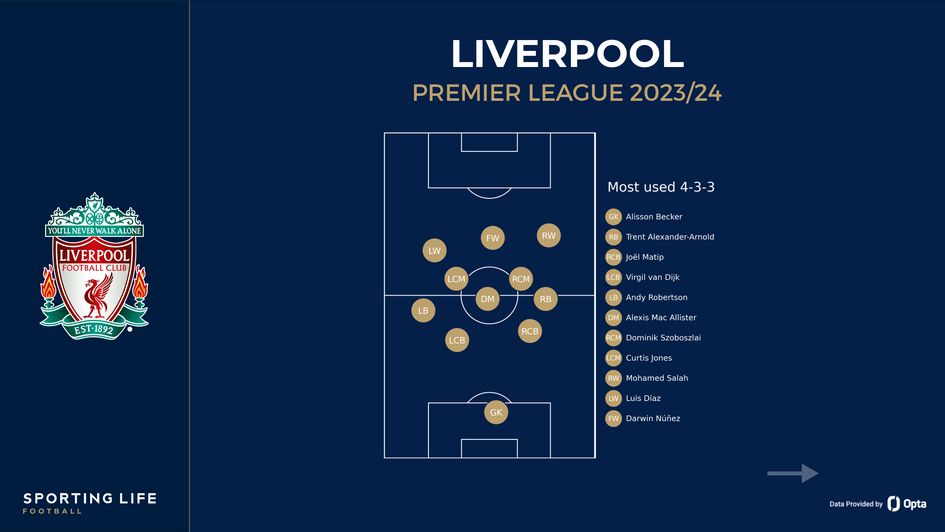That Liverpool are considered to stand a chance of taking a point at the Etihad this Saturday or even, with a win, leap ahead of Manchester City into top spot shows just how little attention is paid to their away form.
For the size of the club and its expectations for 2023/24 it is borderline abysmal. Since the beginning of last season, Liverpool have won just eight out of 25 away matches. Across 2022/23, Liverpool won 23 points on the road. Only 11 clubs recorded fewer than that.
So far this year they are in a similar position after failing to win any of their last three away from Anfield in the Premier League, most recently drawing 1-1 at Luton Town.
And as for the specific challenge of facing Man City, Liverpool won just one of their five ‘Big Six’ away matches last season; have failed to win either of their opening two in 2023/24; and were thrashed 4-1 at the Etihad back in April.
'Liverpool 2.0' depends on away form
Jurgen Klopp’s hopes of a revival, of his ‘Liverpool 2.0’ taking off and the reformatted central midfield finding its feet, depends entirely on improving their away form.
Nobody has a divide quite like Liverpool’s: they have a 100% record at Anfield in all competitions this season (nine wins from nine) and have won 15 and drawn three of the last 18 Premier League matches on home soil.
Such an enormous difference between home and away form is difficult to explain, although there are some important clues to be found in that 4-1 loss at Man City and a tactical battle that captured Liverpool’s problems on the road.
Pep Guardiola’s side destroyed Liverpool in April. The score might have been level at 1-1 at the break but Man City had easily torn through Liverpool’s gung-ho 4-2-4 formation which, leaving the leggy pair of Fabinho and Jordan Henderson to hold the centre when Man City looked to pass out from the back, had far too many gaps to stop the hosts simply playing through.

Man City were assisted by Erling Haaland’s injury, which meant Julian Alvarez dropping intelligently off the front line to further outnumber the Liverpool double pivot, and indeed this might once again become an important subplot after Haaland was injured on international duty with Norway last week.
Both of the tactical reasons behind Man City’s victory – Alvarez’s inclusion and Liverpool’s 4-2-4 – epitomise Klopp’s mistakes on the road: Liverpool are too expansive in their attacks and ought to adapt their strategy for these kinds of matches.
The 1-1 draw with Chelsea on the opening weekend of the season was a wild contest that ultimately favoured the hosts, with Klopp unwilling to calm things down in the pursuit of points.
Similar problems defined the 3-2 defeat at Arsenal last season and the 3-0 loss at Brighton, yet the issue with such an aggressive high line is not limited to games against the stronger clubs.
No change home or away
In short, Liverpool play away games in the same way as those at Anfield.
They assume that an attacking line-up and bold commitment to pushing forward will suffocate the opposition, but instead their hosts - emboldened to counter-attack in greater numbers with the fans behind them – poke holes in a central midfield that lacks bite and a back four that struggles to defend in the transition.
Last season’s 3-1 defeat at Brentford and 3-0 defeat at Wolves were perfect examples of the problem, namely that Liverpool’s primary method of seeking control – pinning the opponent back with waves of pressure – is more effective at Anfield.
On their travels, control should be sought with a more conservative shape and less risky territorial commitment.

However, there is a counterpoint to be raised. It could be argued this analysis applies primarily to last season and not to this one, where results and performances have hinted at a return to the levels seen in 2019/20 or 2021/22…
Newcastle were beaten at St James Park with two late goals after Klopp went for it with an aggressive 4-2-3 despite being down to ten men. Tottenham Hotspur won at home with a last-gasp own goal only because Liverpool were down to nine men.
The draw with Luton was a freak result considering Liverpool racked up a 2.85 xG. If that wasn’t enough caveats, Klopp’s side have been unlucky with the fixture list, facing Newcastle, Spurs, Chelsea, and Brighton in their first six away games.
Perhaps time, and a bit more evidence, will tell us that Liverpool have overcome a psychological blockage and are able to win more consistently away from home this season.
More caution needed at City
Nevertheless they will need to show more caution as they seek control; more midfield domination when they face opposition as strong as themselves.
That begins on Saturday lunchtime, when Klopp will have the choice between a dangerously-inverting Trent Alexander-Arnold and the more conservative option of Joe Gomez, and between the violent charge of Darwin Nunez and the Alvarez-esque false-nine grounding of Diogo Jota.

The safer choices are surely needed to avoid another drubbing at the Etihad, especially with Alexis Mac Allister suspended and Ryan Gravenberch and Curtis Jones joining a long midfield injury list.
Liverpool’s absences are enough to assume Manchester City will win again. But it is the manner of Liverpool’s performance, rather than the result, that will tell us whether Klopp has learnt to take fewer risks in these big away matches.
More chaos, more one-note heavy-metal football, and Liverpool’s chances of challenging for the title will significantly diminish.
More from Sporting Life
- Fixtures, results and live scores
- Expert xG analysis and features
- Transfer news and done deals
- Football and other sports tips
- Download our free iOS and Android app
- Podcasts and video content
Safer gambling
We are committed in our support of safer gambling. Recommended bets are advised to over-18s and we strongly encourage readers to wager only what they can afford to lose.
If you are concerned about your gambling, please call the National Gambling Helpline / GamCare on 0808 8020 133.
Further support and information can be found at begambleaware.org and gamblingtherapy.org.











